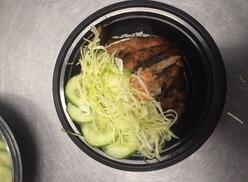As a young restaurant owner, Kiki Sharma has a difficult time deciding which menu item is her favorite. At Bhutan House, her family’s restaurant that she runs with her father, she particularly likes anything spicy, especially their chewy momos. Recently though, the environment of their restaurant looks different. In response to the coronavirus pandemic, Bhutan House has gone through a number of shifts, including their participation with the Nourish to Flourish Initiative.
Nourish to Flourish initiated out of conversations that recognized food insecurity caused by the pandemic and wanted to support local restaurants, economically hit during this time. Like Kiki, many restaurants have been a part of this effort to provide hearty, culturally appropriate meals across the community. Through this project, business owners like John, the chef at Kuya Del, can talk with successful chefs and business owners to increase his knowledge of the industry in Salt Lake City. For John, though, this program is way more than that.

This program has brought John ease of mind. “Being part of this program aligns with our mission and goals to help one another,” John says. “I think it is fascinating that Utahns are coming together to take care of people in our communities. They are my people, and this is why I cook.”
“I came from a third world country and I’ve heard my parents talk of not being able to receive food during times of uncertainty and that really affects me,” John elaborates. “It is my duty to make sure their efforts aren’t lost on me. It’s my role and responsibility to give back and do my part.”
For Kiki as well, whose business began as her parents' dream and has become her dream, Nourish to Flourish is about more than keeping her business alive. The program also extends the reach of her business. “If we’re doing the catering, we’re sharing our food with a lot different people that don’t come to our business area,” she explains. “There’s more opportunity to experience different food.”

Ahimara, who owns Delicius, agrees with Kiki. “I really enjoy that people are learning more about the culture through me,” she shares. “Through our food and through our Venezuelan culture, people can have experience our culture.” She especially appreciates the wide-reaching implications of Nourish to Flourish. “The impact is astronomical,” she says. “It has double even triple ripple effect, not only help families but small business owners as well.”
For these chefs, food is more than just a business, food is a way of sharing what matters to them and a place to connect to the community. For Ahimara, this means an opportunity to bring her culture to Utah. For Kiki, when she wakes up in the morning, she doesn’t think about going to work. “It’s a different kind of excitement,” she says. “We worked really hard. We have a feeling of love going to work.” For John, he pours his heart and soul into each dish he makes. One day, he hopes to be there to meet those receiving his food and show his support for them.
There are countless ways to support entrepreneurs participating in Spice Kitchen Incubator, a program of the International Rescue Committee in Salt Lake City. Learn more about supporting Spice Kitchen Incubator and the diverse group of entrepreneurs by visiting SpiceKitchenIncubator.org.
Read more about the newly established Nourish to Flourish Initiative by visiting their website: NourishtoFlourish.org.
And, as Kiki says, “eat locally, support locally.”